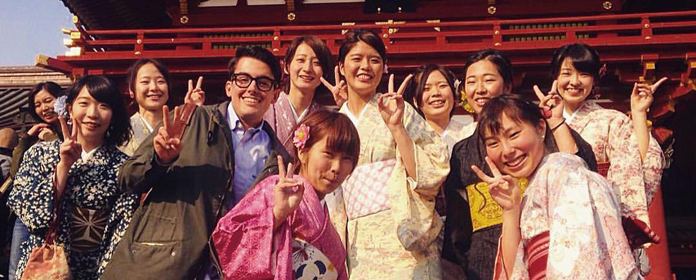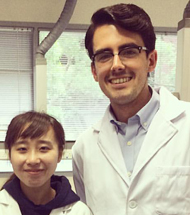"Stays demonstrate initiative, determination and adaptability, qualities that are highly valued in the job market."
Interview with Álvaro San Juan, student of the School who has carried out exchanges in Argentina, United Kingdom and Hong Kong.

PHOTO: Courtesy

PHOTO: Courtesy
Álvaro San Juan Rodríguez (7th year of the Double Degree in Pharmacy + Human Nutrition and Dietetics) carries out his supervised stays at the Navarra Hospital Complex. From there he underlines the importance that the faculty of the School of Pharmacy and Nutrition, the facility to collaborate in the Departments, the exchanges in three different countries and the participation in Pharmacists of the XXI century have had for him during the years of degree program .
- How is your experience in the supervised stays at the Hospital Complex going?
I am very satisfied with the course of my stay in the Pharmacy Service of the Navarra Hospital Complex. The team has provided me with a very friendly and close attention . In addition, both the residents and the assistant pharmacists of the service have been available at all times to answer any questions and to pass on their knowledge to me.
- Why did you choose this center and what work do you do there?
Due to my interest in the research in Health Services, I wanted to know first hand the work of health professionals, and especially the pharmacist - due to its close relationship with the rest of the areas and hospital services -, within a public center. As Navarra is also synonymous with quality in hospital services, I did not hesitate to choose the complex to carry out my supervised stays.
My assignment there involves rotating through different areas of the service: management, compounding, dispensing and pharmaceutical care. In these rotations I perform various tasks, such as the preparation of magistral formulas, intravenous mixtures and artificial nutrition, drug refills and medicine cabinets, as well as dispensing medications at research clinic, review and validation of medical prescriptions or dispensing to inpatients, day hospital and outpatients.
- Also, during your years at degree program you made several exchanges. What would you highlight from each of the experiences?
From my experience in Argentina I would highlight the hospitality of the country, where I felt at home but 10,000 kilometers away, and the great use made by the universities of the few resources they have. On the other hand, in the United Kingdom, where I was also at exchange, I was surprised by the model of teaching, based on providing student with the necessary tools for knowledge instead of encouraging their capacity for retention. In addition, I would highlight the internship of professional competencies and skills throughout the degree program.
In the last exchange, in Hong Kong, the most remarkable thing was the city itself, so cosmopolitan, where I met and shared experiences with people of very diverse origins and cultures, as well as the fact of familiarizing myself with Chinese customs and habits.
- Why would you recommend that students do not miss the opportunity to take part in exchanges during the degree program?
First of all, because any experience abroad allows us to get to know realities and customs different from our own, to expand our contacts network and, depending on the case, to improve the level of a second language. In addition, stays abroad demonstrate initiative, determination and adaptability, qualities that are highly valued in the job market.
At staff a exchange generates a lot of unique and unforgettable experiences. Life is lived much more intensely abroad, outside our comfort zone.
- After the experience in other countries, what would you say is lacking in the training in Spain and what are our strengths?
From the Spanish system of teaching I would clearly highlight the broad theoretical foundation it provides to student and the comprehensive approach of the disciplines. However, the application and integration of such knowledge in internship is left aside and assessment focuses too much on the mere retention capacity of students.
- From your seven years at the School, what two or three fundamental issues do you see as differentiating the training at the University of Navarra?
On the one hand, I would highlight the quality of the professor: most of the faculty combine their professions with research and teaching. This means that they are constantly up to date with the advances in their areas and that they transmit them to the students, illustrating them with examples from their own professional activity. In fact, the University enjoys a high level of international recognition also thanks to the scientific production of these researchers.
At the University, moreover, you are not a issue on a list. The attention is very staff and there is a close relationship with the professors, who take into account the circumstances and characteristics of each student.
Another differential point is the promotion of initiative, for which we facilitate stays at Departments as intern students, participation in congresses, conference or conferences and, through the Careers OfficeIn addition, permanent advice is provided to select centers and companies for internships, so that the student is trained in professional skills and in everything that prepares us to access the labor market. This is a global market, and the University is aware of this and encourages the internationalization.
- Finally, as student co-organizer of Pharmacists of the 21st Century, what did this experience give you?
It meant contact direct contact with professionals who are shaping the future of the profession in many areas -industry, healthcare, research, community pharmacy...-. I was also able to develop competencies and skills -communication, organization, leadership, problem solving or management of resources-. However, the most satisfying aspect was the success of the successive editions and the commitment it aroused among my colleagues.
